At the Sphinx Competition and SphinxConnect convention, Rita Fernandes experienced an array of inspiring events that went beyond simply addressing diversity in classical music
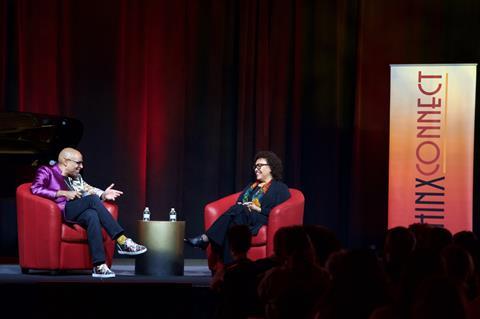
Discover more Featured Stories like this in The Strad Playing Hub.
Read more premium content for subscribers here
The Sphinx Organization is big. Really big. That is true of its vision, impact and sheer size. If president Afa Dworkin’s visionary speech that began SphinxConnect’s opening plenary session weren’t grand enough, that evening’s guest was no less than the chair of the US National Endowment for the Arts, Maria Rosaria Jackson, in conversation with Sphinx Organization founder Aaron P. Dworkin.
The annual convention, this year named SphinxConnect: Amplify, took place from 25 to 27 January at the Renaissance Center in Detroit and featured more than 30 panels and workshops on diversity in classical music. The Sphinx Competition events were scattered throughout, with the convention culminating in the senior division finals.
At the centre of the monumental Sphinx Organization, however, is the idea of the family, or ‘la familia’, as its members put it. It refers to the community the musicians become a part of, and it makes for an inclusive atmosphere – even when you’re surrounded by a record 1,300 SphinxConnect attendees. The ‘family’ idea also points to the fact that the organisation’s ambitious visions have substance. As one competition entrant aptly put it: ‘Sphinx isn’t just complaining; it’s actually going out there and doing it.’ The original annual SphinxCon (inaugurated in 2012), which initially concentrated on Black and Latinx representation in classical music, was revamped by Afa Dworkin in 2017 as the more ‘artist-led’ SphinxConnect and has since become one of the largest conventions in the US dedicated to diversity in the arts full stop. ‘It is now something that people need to come to,’ Aaron Dworkin told me.
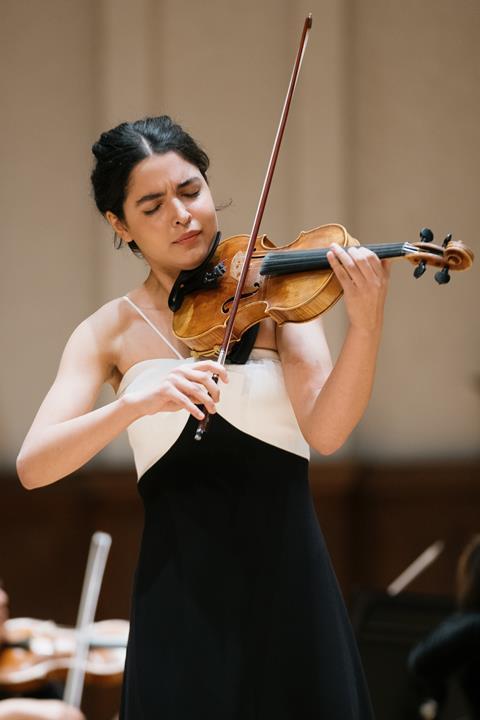
The competition (which is how the organisation began and is now its flagship event) was created in 1997 to give Black and Latinx string players access to substantial prizes and career development opportunities. Since then, the organisation has established myriad educational initiatives at all levels, and effectively raised a generation of Sphinx musicians. This ‘pipeline’ (as Afa Dworkin calls it) was in full effect in January 2024, with 50 per cent of the semi-finalists having participated in Sphinx programmes and most of the jury – comprising Joseph Conyers, Randall Goosby, Alasdair Tait, George Taylor, Elena Urioste, Seth Parker Woods and John Zion – being Sphinx alumni. And, most crucially, the organisation allows musicians to do what they love: make music; as one finalist put it, it prevents the situation of ‘being the only black person around me playing’.
The Sphinx Competition semi-finals took place on 25 January. Both the junior (age 17 and under) and senior (18–30) divisions boasted impressively high-level playing. The amount of repertoire I discovered (half the imposed pieces were by Black or Latinx composers) felt like a paradigm shift. The Double Bass Concerto (2012) by Argentinian composer Andrés Martín, in particular, was a revelation. In the case of Coleridge-Taylor’s Violin Concerto, it was telling that a work I had previously known only vaguely became, through repetition, a staple in my mind; and yet, sadly, it’s a piece you rarely, if ever, hear in other major competitions: a bittersweet reminder of just how easy norms can change just through exposure.
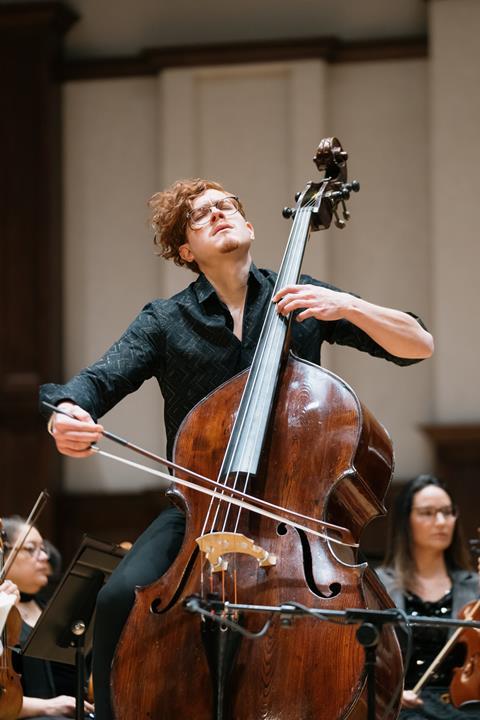
In the same way that the competition reflects Sphinx’s values by promoting diverse repertoire, the competitors also mirror the organisation’s forward-thinking and empathetic nature. Senior finalist and violinist Nathan Amaral, 28, for example, recently created a festival to bring music to underprivileged children in his native Brazil, while senior finalist and bassist Aaron Olguin, 29, aims to bring wider appeal to the Martín concerto through more performances and a recording. Sphinx, Amaral explains, allows its musicians to express themselves truthfully and fully. And it is no secret that this inevitably makes you a better musician.
Between competition events, there was never a dull moment. One minute I was learning about underplayed Latin American music and composers, the next I was listening to a star-studded panel talk about ‘excellence through diversity’ or watching a boundlessly enthusiastic Conyers give a packed masterclass. The non-stop inspiration informed not only my views on diversity in music, but also my understanding of the arts’ place in society altogether.
The junior competition finals took place at midday on 26 January at the Max M. and Marjorie S. Fisher Music Center’s Orchestra Hall. The bustling audience was full of energetic schoolchildren with whom Sphinx had worked in the past. At one point, they were given the opportunity to put questions to Joseph Young, the conductor of the Sphinx Symphony Orchestra (which performed with the competitors), a memorable one being, ‘What’s your favourite colour?’
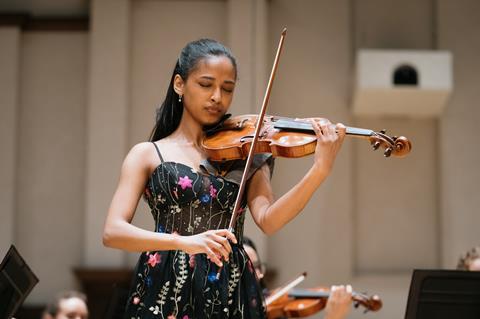
Rebecca Beato, 17, began with Mozart’s Violin Concerto no.3. She was confident, with a full sound, but her interpretation could have had more shape. Next was one of my favourite semi-finalists, 13-year-old cellist Sonya Moomaw. She exuded genuine joy throughout Haydn’s C major Cello Concerto, and performed her own cadenza based on the jazz standard Autumn Leaves. It’s the type of thing that you just can’t help but feel deeply fortunate to have witnessed. Finally, there was violinist Ana Isabella España, 17, who also played the Mozart. She had solid sound, and no interpretative choice was accidental nor unoriginal. She won the $10,000 first prize, while Beato came second ($5,000) and Moomaw third ($3,000).
On the evening of 27 January, also at Orchestra Hall, two fantastic orchestral works bookended the senior division finals concert: the opener by Quenton Xavier Blache – the premiere of the adaptation of his 2023 string orchestra piece Habari gani; and Carlos Simon’s Holy Dance (2023) to close proceedings. I was pleased to add two more terrific pieces by diverse composers to my ever-growing list.
Violinist Bethlehem Kelley, 22, kicked off the finals with a strong and soloistic rendition of the first movement of Coleridge-Taylor’s Concerto. Next came bassist Olguin, with the third movement of my new favourite work, the Martín Concerto. The introduction was cleverly understated, making for a powerful first theme. He had an impressive emotional range and pulled off stunning feats of virtuosity.
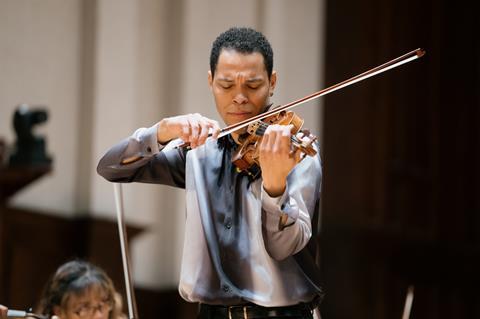
I was most keen to watch Amaral, as I had not expected him to get through to the finals. But those doubts left me from his first note. He instantly captured my attention when rather than the playing the written forte on the stately first chord of the Coleridge-Taylor, he played it piano. And his intense care for every note made for a uniquely moving performance. He ultimately took home the $50,000 first prize, becoming the first ever Brazilian to win the competition. Olguin won the $20,000 second prize and $5,000 audience prize, while Kelley won the $10,000 third prize.
In true Sphinx fashion, the night ended with a dance party, with Coleridge-Taylor passing the baton to Michael Jackson and Beyoncé for the evening’s soundtrack. As the competitors joined the party from backstage, they received hugs from friends, family and even jury members, and a celebratory and familial atmosphere filled the room – a feeling that had defined every event I’d attended in those few days.
The Sphinx Competition, SphinxConnect convention and Sphinx Organization are more than a competition, convention and organisation. They are all ways of envisioning and ensuring a brighter future for the arts. From what I experienced, it became clear that addressing diversity actually results in addressing problems outside diversity itself – whether that be programming or creating space for musicians to feel heard. As one panel speaker put it, ‘Diversity benefits everyone.’
Read: Sphinx Organization: Change for good
Read: Brazilian violinist wins the 2024 Sphinx Competition senior division
Discover more Featured Stories like this in The Strad Playing Hub.
Read more premium content for subscribers here
The number one source for playing and teaching books, guides, CDs, calendars and back issues of the magazine.
In The Best of Technique you’ll discover the top playing tips of the world’s leading string players and teachers. It’s packed full of exercises for students, plus examples from the standard repertoire to show you how to integrate the technique into your playing.
The Strad’s Masterclass series brings together the finest string players with some of the greatest string works ever written. Always one of our most popular sections, Masterclass has been an invaluable aid to aspiring soloists, chamber musicians and string teachers since the 1990s.
American collector David L. Fulton amassed one of the 20th century’s finest collections of stringed instruments. This year’s calendar pays tribute to some of these priceless treasures, including Yehudi Menuhin’s celebrated ‘Lord Wilton’ Guarneri, the Carlo Bergonzi once played by Fritz Kreisler, and four instruments by Antonio Stradivari.













































No comments yet